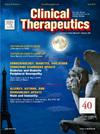结直肠癌患者血浆Septin9甲基化状态与抗肿瘤药物治疗反应的关系
IF 3.6
4区 医学
Q2 PHARMACOLOGY & PHARMACY
引用次数: 0
摘要
目的:尽管septin 9甲基化(mSEPT9)在结直肠癌(CRC)中的诊断潜力已经在许多研究中得到了很好的证明,但其在确定晚期结直肠癌患者对抗肿瘤药物治疗反应中的预测作用仍未被探索。方法:这项现实世界的大规模回顾性研究分析了从1490例接受mSEPT9检测的患者的综合数据库中选择的1098例CRC病例。我们首先在整个CRC队列中研究了mSEPT9状态与临床病理特征之间的关系。随后,在479例接受全身抗肿瘤治疗的IV期CRC患者中,我们通过评估治疗结果(包括客观缓解率(ORR)和无进展生存期(PFS))来评估mSEPT9状态的预测价值。结果:与Ⅰ-Ⅲ期患者相比,Ⅳ期患者mSEPT9阳性水平显著升高,且与东部肿瘤合作组(ECOG)评分相关,但与其他临床病理特征无关。与msept9阴性患者相比,msept9阳性患者对氟嘧啶、奥沙利铂和贝伐单抗的ORR显著更高,而伊立替康或西妥昔单抗的ORR无显著差异。相反,msept9阳性患者使用氟嘧啶、奥沙利铂、伊立替康和西妥昔单抗的PFS较短,但两组使用贝伐单抗的PFS相当。意义:mSEPT9状态与结直肠癌分期及ECOG评分显著相关,影响晚期结直肠癌抗肿瘤药物的疗效。尽管msept9阳性患者对某些药物表现出更高的ORR,但他们表现出更短的PFS,表明肿瘤生物学更具侵袭性。贝伐单抗似乎部分抵消了mSEPT9阳性的不良预后影响。这是mSEPT9对晚期结直肠癌治疗结果的预测价值的首次证明,为个性化治疗提供了新的见解。本文章由计算机程序翻译,如有差异,请以英文原文为准。
Association of Plasma Septin9 Methylation Status With Therapeutic Response to Antitumor Agents in Colorectal Cancer Patients
Purpose
Although the diagnostic potential of septin 9 methylation (mSEPT9) in colorectal cancer (CRC) has been well documented in numerous studies, its predictive role in determining therapeutic response to antitumor agents among patients with advanced CRC remains unexplored.
Methods
This real-world, large-scale retrospective study analyzed 1098 CRC cases selected from a comprehensive database of 1490 patients who underwent mSEPT9 testing. We first investigated the association between mSEPT9 status and clinicopathological characteristics in the overall CRC cohort. Subsequently, in a subset of 479 stage IV CRC patients receiving systemic antitumor therapy, we evaluated the predictive value of mSEPT9 status by assessing treatment outcomes, including objective response rate (ORR) and progression-free survival (PFS).
Findings
mSEPT9 positivity was significantly elevated in stage Ⅳ versus stage Ⅰ–Ⅲ patients and correlated with Eastern Cooperative Oncology Group (ECOG) score, but not with other clinicopathological features. mSEPT9-positive patients demonstrated significantly higher ORR to fluoropyrimidines, oxaliplatin, and bevacizumab compared with mSEPT9-negative patients, whereas no significant ORR differences were observed for irinotecan or cetuximab. Conversely, mSEPT9-positive patients showed shorter PFS with fluoropyrimidines, oxaliplatin, irinotecan, and cetuximab, but comparable PFS with bevacizumab between the 2 groups.
Implications
mSEPT9 status significantly correlated with CRC stage and ECOG score, influencing antitumor agents efficacy in advanced CRC. Although mSEPT9-positive patients showed higher ORR to certain agents, they exhibited shorter PFS, suggesting more aggressive tumor biology. Bevacizumab appeared to partially counteract the adverse prognostic impact of mSEPT9 positivity. This first demonstration of mSEPT9′s predictive value for advanced CRC treatment outcomes provides new insights for personalized therapy.
求助全文
通过发布文献求助,成功后即可免费获取论文全文。
去求助
来源期刊

Clinical therapeutics
医学-药学
CiteScore
6.00
自引率
3.10%
发文量
154
审稿时长
9 weeks
期刊介绍:
Clinical Therapeutics provides peer-reviewed, rapid publication of recent developments in drug and other therapies as well as in diagnostics, pharmacoeconomics, health policy, treatment outcomes, and innovations in drug and biologics research. In addition Clinical Therapeutics features updates on specific topics collated by expert Topic Editors. Clinical Therapeutics is read by a large international audience of scientists and clinicians in a variety of research, academic, and clinical practice settings. Articles are indexed by all major biomedical abstracting databases.
 求助内容:
求助内容: 应助结果提醒方式:
应助结果提醒方式:


